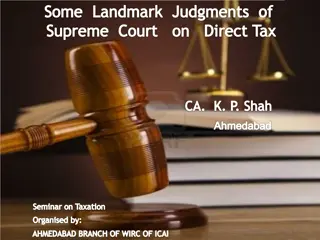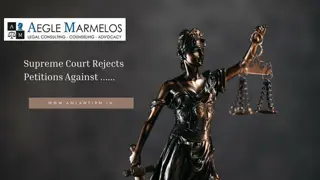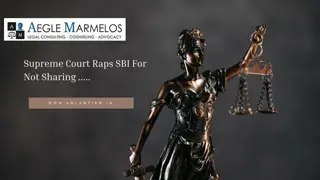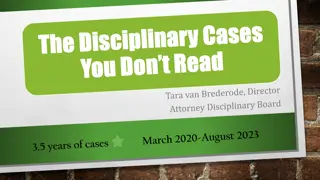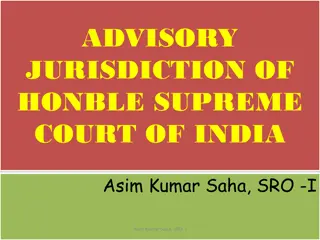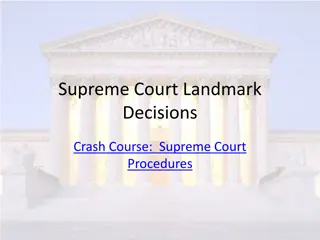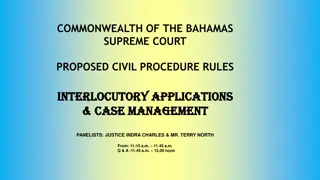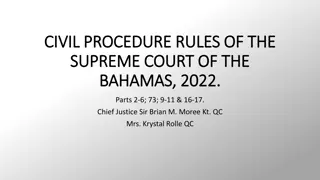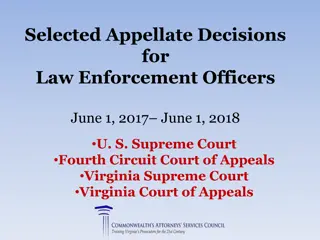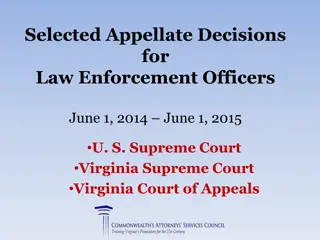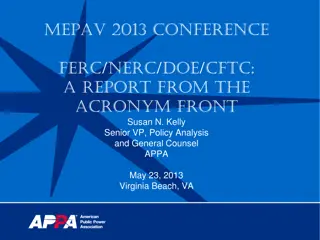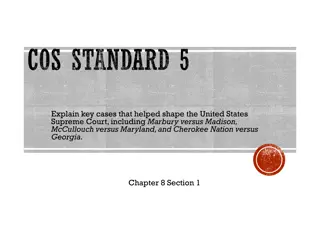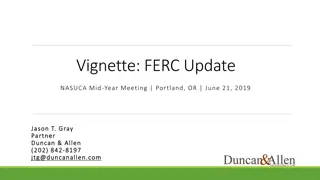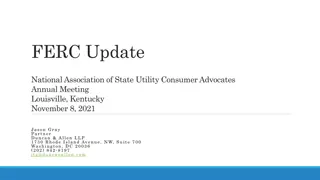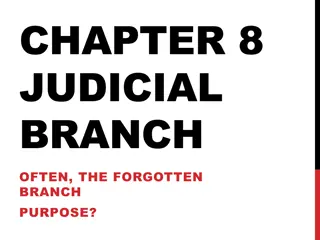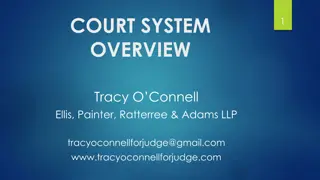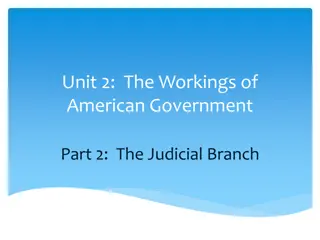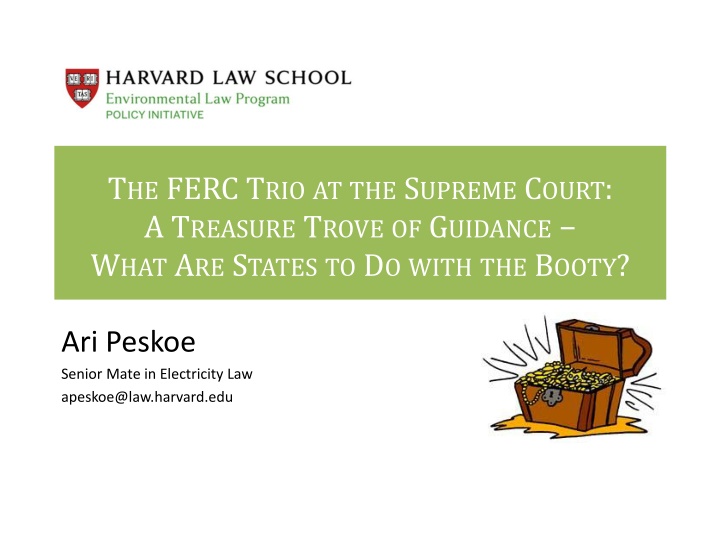
The FERC Trio at the Supreme Court: A Treasure Trove of Guidance
The Federal Power Act, Natural Gas Act, preemption principles, and FERC's jurisdiction over electric energy and natural gas transmissions are explored in relation to State law. Learn about key cases and the state-federal jurisdictional border, offering insights on how states can navigate legal considerations arising from federal actions.
Download Presentation

Please find below an Image/Link to download the presentation.
The content on the website is provided AS IS for your information and personal use only. It may not be sold, licensed, or shared on other websites without obtaining consent from the author. If you encounter any issues during the download, it is possible that the publisher has removed the file from their server.
You are allowed to download the files provided on this website for personal or commercial use, subject to the condition that they are used lawfully. All files are the property of their respective owners.
The content on the website is provided AS IS for your information and personal use only. It may not be sold, licensed, or shared on other websites without obtaining consent from the author.
E N D
Presentation Transcript
THE FERC TRIOATTHE SUPREME COURT: A TREASURE TROVEOF GUIDANCE WHAT ARE STATESTO DOWITHTHE BOOTY? Ari Peskoe Senior Mate in Electricity Law apeskoe@law.harvard.edu
Overview 1. The Federal Power Act and Natural Gas Act 2. OneOK v. Learjet (2015) 3. FERC v. EPSA (2016) 4. Hughes v. Talen Energy (2016) 5. The State-Federal Jurisdictional Border 2
Preemption Federal action preempts State law when: 1) Congress has explicitly preempted State law; 2) A court determines Federal law occupies the field; or 3) A court determines that Federal law conflicts with State law. 3
The Federal Power Act FERC s jurisdiction includes: 1) the transmission of electric energy in interstate commerce 2) the sale of electric energy at wholesale in interstate commerce 3) any rule, regulation, practice, or contract affecting [the] rate of 1) or 2) FERC s jurisdiction does NOT cover: 1) any other sale of electric energy 2) facilities used for the generation of electric energy 3) facilities used in local distribution or only for the transmission of electric energy in intrastate commerce 4
The Natural Gas Act FERC s jurisdiction includes: 1) the transmission of electric energy in interstate commerce 2) the sale of electric energy at wholesale in interstate commerce 3) any rule, regulation, practice, or contract affecting [the] rate of 1) or 2) 1) the transportation of natural gas in interstate commerce 2) the sale in interstate commerce of natural gas for resale FERC s jurisdiction does NOT cover: 1) any other sale of electric energy 2) facilities used for the generation of electric energy 3) facilities used in local distribution or only for the transmission of electric energy in intrastate commerce 1) any other transportation or sale of natural gas 2) facilities used for such distribution or to the production or gathering of natural gas. 5
The Natural Gas Act FERC s jurisdiction includes: 1) the transportation of natural gas in interstate commerce 2) the sale in interstate commerce of natural gas for resale 3) any rule, regulation, practice, or contract affecting [the] rate of 1) or 2) FERC s jurisdiction does NOT cover: 1) any other transportation or sale of natural gas 2) facilities used for such distribution or to the production or gathering of natural gas. 6
The FPA/NGA Jurisdictional Divides States FERC Retail Sales Generation/Production facilities Distribution and intra-state transmission/transportation facilities Wholesale sales in interstate commerce Interstate transmission / transportation Practices affecting 7
Decisions about FPA Apply to NGA and Vice-Versa The relevant provisions of the two statutes are in all material respects substantially identical. FPC v. Sierra Pacific Power Co.,350 U. S. 348, 353 (1956). In this opinion we therefore follow our established practice of citing interchangeably decisions interpreting the pertinent sections of the two statutes. -Arkansas Louisiana Gas Co. v. Hall, 453 U.S. 571, n. 7 (1981) 8
OneOK v. LearJet Question Presented: Does the Natural Gas Act preempt state-law claims challenging industry practices that directly affect the wholesale natural gas market when those claims are asserted by litigants who purchased gas in retail transactions? 9
OneOK v. LearJet Holding: Antitrust claims under state law are not preempted by the Natural Gas Act. The Court s precedents emphasize the importance of considering the target at which the state law aims in determining whether that law is pre-empted. the dissent argue[s] that there is . . . a clear division between areas of state and federal authority . . . But that Platonic ideal does not describe the natural gas regulatory world. 10
FERC v. EPSA Electricity Market Supply Curve (illustrative example) 11
FERC v. EPSA Demand Response providers reduce consumption in response to a price signal. FERC Order No. 719 (2008) requires wholesale market operators to allow aggregators of demand response resources to participate in energy markets, unless prohibited by state law. FERC Order No. 745 (2011) requires market operators to pay demand response the same price that generators receive (LMP). 12
2014 DC Circuit Decision Dissent: 13
What Did the Supreme Court Say? 1) FERC s affecting jurisdiction is limited to rules or practices that directly affect wholesale rates. 2) FPA does not bar FERC from regulating the wholesale market, even when doing so affects retail sales. 3) EPSA s position would subvert the FPA. 4) FERC engaged in reasoned decision making. 14
Hughes v. Talen Net Generation Net Consumption 15
Hughes v. Talen Top 10 Constraints Affecting PJM Congestion Costs 16
Hughes v. Talen Maryland PSC ordered distribution utilities to enter into contracts-for-differences with a power plant developer (CPV) Contract paid CPV the difference between set prices and the PJM energy and capacity rates. Fourth Circuit: The PSC order functionally sets the rate and thus compromises the integrity of the federal scheme and intrudes on FERC s jurisdiction. NJ established a substantially similar program. 17
Hughes v. Talen Court affirmed the 4th Circuit s decision. By adjusting an interstate wholesale rate, Maryland s program invades FERC s regulatory turf. Our holding is limited. So long as a State does not condition payment of funds on capacity clearing the auction, the State s program would not suffer from the fatal defect that renders Maryland s program unacceptable. Court did not determine whether Maryland s program was conflict preempted. 18
The State-Federal Jurisdictional Border Has the Bright Line disappeared? What is the future of cooperative federalism under the FPA and NGA? The Federal Power Act eliminates vacuums of authority over the electricity markets. FPA preemption may be narrow; the scope of conflict preemption is an open question. 19
Whats Next? Litigation Updates 20
Whats Next? Who regulates rooftop solar? 21
StatePowerProject.org Tracks recent lawsuits challenging State electricity policies under the dormant Commerce Clause or Supremacy Clause Sign up for updates - http://statepowerproject.org/updates/


